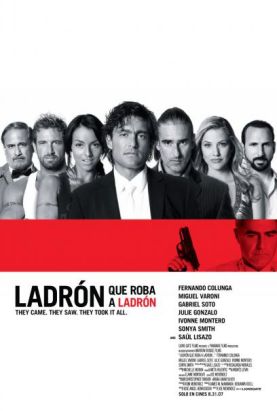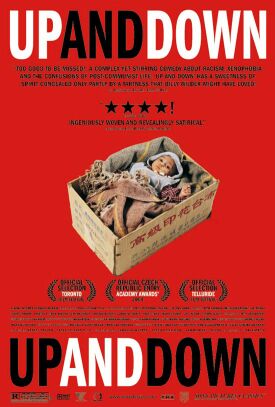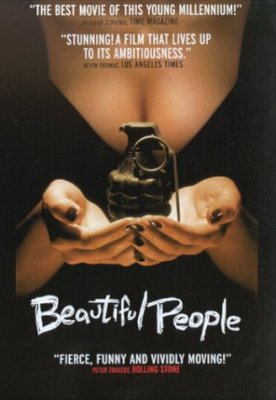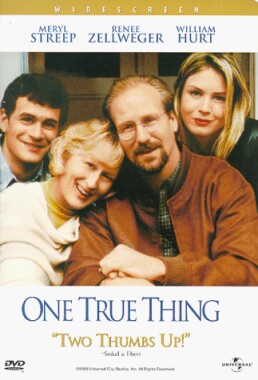Ladrón que roba a ladrón
The makers of Ladrón que roba a ladrón, director Joe Menendez and writer JoJo Henrickson, and/or its publicists seem not to want to offer us an English translation of its title, which is literally: “the thief who steals from a thief. . .” It is the first part of a Spanish proverb which ends, “. . . will receive 100 years of pardon.” I might have suggested as an accompanying translation the English (and therefore Purgatory-free) proverb, “Set a thief to catch a thief,” but that the cumbersomeness of the Spanish for an English-speaking audience seems deliberate. And provocative. It is rather in the spirit of the Latino character in the film who tells a monoglot Americano, in English, “Hey, you’re in America! Learn Spanish, a-hole!”
The political dimension of what is otherwise a not-too-bad heist movie is on display elsewhere as well. The premiss on which it is based is that immigrants are invisible. Not only English-speaking Americans but even their fellow Latinos who have been here for a while and who have been successful, don’t see them as they perform the menial and ill-paid tasks in which we (mostly) employ them. Therefore, if you want to rob a rich Latino businessman who keeps all his money in a vault in his house — being from Argentina, he doesn’t trust banks — all you have to do is to recruit some ordinary immigrantes to pose as servants and infiltrate his high-security estate. It seems a doubtful enough proposition to me, but let that go. Our enjoyment as we watch the plot unfold is no more affected by its probability of success than is usually the case in such caper movies.
There is, however, an extra layer of enjoyment intended for us in the fact that the main plotters, Alejandro (Fernando Colunga) and Emilio (Miguel Varoni), though self-confessed thieves, live by a code that their victim, Moctesuma Valdez (Saúl Lisazo), has violated. A former associate and friend of Emilio, Moctesuma — whose real name is Claudio Silvestrini — has built up a business empire by selling dud patent medicines to gullible immigrants. The honor among these thieves is that “you don’t steal from your own.”
“I remember when Claudio Silvestrini had ethics,” Emilio reproaches him.
“That’s why I left the team,” the new-minted Moctesuma replies.
Of course, the implication is that, if he were stealing from those of us who haven’t the good fortune to be Latino, it would be OK, and Moctesuma could be allowed to go about his fraudulent business in peace. As it is, we see what a bad guy he is, what cool guys Alejandro and Emilio are, and what sympathetic strivers are the ordinary immigrants they choose to help them, and we are meant to say to such Robin Hoods, Viva La Revolución!
Alejandro, when he’s not robbing rich patent medicine salesmen, sells pirated videos on street corners. I thought as I watched that it was unlikely such a man could be a hero of a commercially produced movie, even one of left-wing sentiments, given how concerned the movie business is about piracy. I kept expecting him to turn out to be another villain.
Whether or not he does, I’ll let you find out for yourselves, but there is a much more piquant irony in that, at the very end, Alejandro explains to Emilio how he chose the immigrantes who would be the “crew” for their heist. “By the movies they bought from me. They all liked the ones where the thieves triumph in the end.” In this respect at least, the immigrants are already assimilated into American culture. Thieves who triumph in the end have been a staple of American movies almost since the abolition of the Hays Code in the mid-1960s, which prohibited showing people profiting from crime. Yet, superimposed upon the routine prison-fantasy, there is in Ladron, also a rather Hispanic sounding moralism that would not have been cool enough for the makers of Ocean’s Eleven and the plethora of similar trashy heist flicks.
Not only are Alejandro and Emilio highly moralistic when it comes to stealing from their fellow immigrants — just how highly, you have to wait to the end to find out — but Emilio, at least, even seems to have religion. At one point he offers up a comic prayer that is, nevertheless, meant to be touching: “O Lord, I have broken the fifth. . .[pause]. . . the third. . .[longer pause] — one of your commandments. Again. But you know my heart is in the right place.” He also asks Moctesuma if there’s one of the Seven Deadly Sins he hasn’t committed. “Sloth,” his former friend replies with a smile. Admittedly, it’s not much to pin a hope on, but maybe Hollywood, if it ever really notices the immigrants in our midst, will learn from them once again to treat big-time larceny as if it raised moral as well as logistical problems.
Discover more from James Bowman
Subscribe to get the latest posts to your email.








